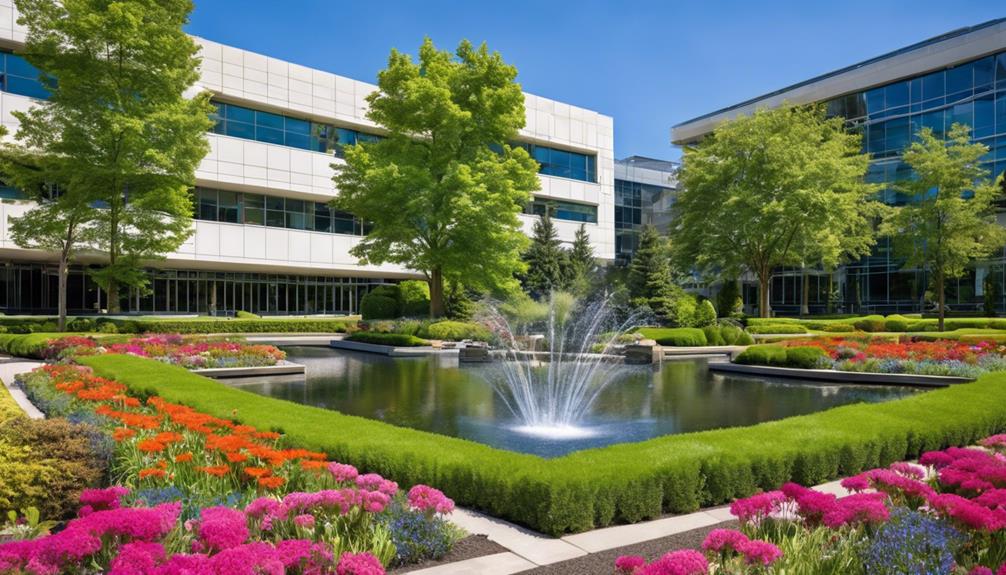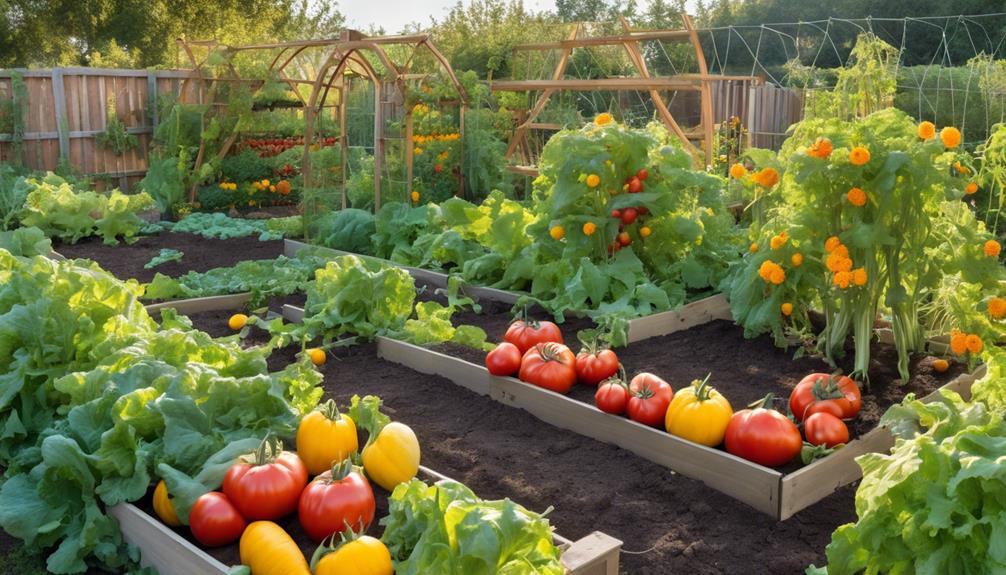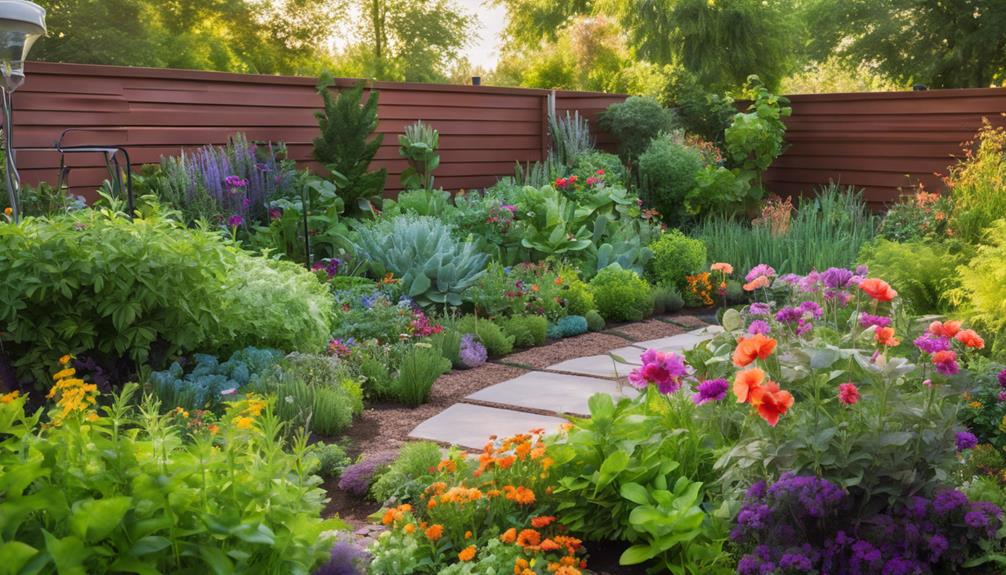
Sidewalk and Pathway Cleaning Bournville
23 February 2025
Beginner’s Guide to Simple Garden Design Projects
23 February 2025Investing in garden maintenance for commercial properties is essential for enhancing curb appeal and increasing property value. A well-maintained landscape creates a positive first impression, attracting tenants and customers while fostering business relationships.
Sustainable landscaping practices, such as utilising native plants and efficient irrigation, not only enhance aesthetics but also promote environmental responsibility. Regular soil health assessments and seasonal planting strategies further ensure robust plant growth and visual appeal.
Ultimately, consistent garden maintenance can lead to increased occupancy rates and reduced vacancy periods for commercial properties, paving the way for long-term profitability. There is much more to explore regarding these significant benefits.
Importance of Curb Appeal
Curb appeal plays a vital role in shaping initial impressions for visitors and potential clients.
A well-maintained garden not only enhances the aesthetic appeal of a commercial property but also significantly contributes to its overall value.
Therefore, investing in effective garden maintenance is crucial for attracting business and fostering a positive image.
First Impressions Matter
The exterior landscape of a commercial property serves as the primary point of contact for potential clients and visitors, making it crucial to create a welcoming atmosphere.
A meticulously maintained garden not only enhances aesthetic appeal but also conveys professionalism and attention to detail. When prospective clients approach a property, they form judgements based on visual cues; an inviting landscape can foster positive perceptions and set the tone for future interactions.
Furthermore, well-tended greenery signifies respect for the environment and a commitment to quality, which can resonate deeply with discerning clients.
In competitive markets, initial impressions can greatly influence business relationships, underscoring the necessity of investing in garden maintenance to ensure your property stands out and reflects your brand's values.
Enhances Property Value
Enhancing property value through effective garden maintenance is a strategic investment for commercial properties. A well-maintained landscape not only boosts aesthetic appeal but also reinforces the brand image of the business.
Curb appeal significantly influences potential tenants and customers, often translating into higher occupancy rates and rental yields. Furthermore, an attractive environment can reduce vacancy periods, as prospective clients are drawn to visually appealing spaces.
Regular upkeep demonstrates a commitment to quality, fostering trust and satisfaction among stakeholders. In addition, well-designed gardens can improve stormwater management and reduce energy costs, further increasing the overall property value.
Essentially, investing in garden maintenance is not merely an aesthetic choice; it is a fundamental aspect of maximising long-term returns on commercial real estate.
Sustainable Landscaping Practices
Sustainable landscaping practices are crucial for enhancing the ecological integrity of commercial properties.
By incorporating native plant selection, implementing water-efficient irrigation systems, and utilising soil health improvement techniques, property managers can create beautiful landscapes that require less maintenance and resources.
These practices not only benefit the environment but also contribute to the long-term sustainability of the property.
Native Plant Selection
Choosing native plants for commercial landscaping not only fosters a sense of place but also supports local ecosystems and biodiversity. By integrating these plants into your property, you can achieve numerous benefits that resonate with both your brand and the environment.
Consider the following advantages:
- Enhanced Aesthetics: Native plants create visually appealing landscapes that reflect regional character.
- Reduced Maintenance: These plants are well-adapted to local conditions, requiring less care and resources.
- Wildlife Support: Native species provide vital habitats and food sources for local fauna.
- Soil Health Improvement: Native plants contribute to healthier soils, promoting a balanced ecosystem.
Investing in native plant selection not only enhances your property but also champions sustainable practices that resonate with environmentally-conscious stakeholders.
Water-Efficient Irrigation Systems
Implementing water-efficient irrigation systems is essential for commercial properties aiming to minimise water usage while maintaining vibrant landscapes.
These systems not only contribute to sustainability but also enhance the aesthetic appeal of the property, fostering a positive impression on clients and visitors.
Consider the following benefits of investing in such systems:
- Cost Savings: Reduced water bills can significantly lower operational expenses.
- Environmental Responsibility: Conserving water demonstrates your commitment to sustainability.
- Healthier Plants: Precise watering leads to stronger, more resilient landscaping.
- Regulatory Compliance: Adhering to local water regulations protects your business from potential fines.
Soil Health Improvement Techniques
How can commercial properties enhance their landscaping while promoting environmental health? Implementing soil health improvement techniques is essential for sustainable landscaping practices.
Healthy soil fosters robust plant growth, boosts biodiversity, and contributes to ecosystem resilience. Consider these effective strategies:
- Composting: Enrich soil with organic matter, improving nutrient availability and structure.
- Cover Cropping: Plant cover crops to prevent erosion, suppress weeds, and enhance soil fertility.
- Mulching: Apply organic mulch to retain moisture, regulate temperature, and suppress weeds, benefiting soil microorganisms.
- Soil Testing: Regularly analyse soil composition, allowing for tailored amendments that promote optimal health.
Soil Testing Procedures
Soil testing procedures commence with an initial site assessment to evaluate the existing soil conditions and identify any specific requirements.
This foundational step is critical for implementing effective strategies such as mulching for moisture retention and the application of compost tea to enhance soil fertility.
Initial Site Assessment
Conducting a thorough initial site assessment is crucial for effective garden maintenance in commercial properties, particularly concerning soil quality. This process enables property managers to make informed decisions that enhance the overall health of the landscape.
Key components of soil testing procedures include:
- pH Level Determination: Understanding soil acidity or alkalinity aids in selecting appropriate plants.
- Nutrient Analysis: Identifying deficiencies in essential nutrients ensures optimal growth conditions.
- Soil Texture Evaluation: Assessing the composition informs irrigation and drainage strategies.
- Contaminant Screening: Testing for harmful substances protects plant health and employee safety.
Mulching for Moisture Retention
Effective garden maintenance often hinges on the application of mulch, which plays a crucial role in moisture retention. By creating a protective layer over the soil, mulch not only conserves water but also promotes healthier plant growth.
Consider the following benefits of mulching:
- Reduced Watering Frequency: Less evaporation means less frequent irrigation, saving time and resources.
- Temperature Regulation: Mulch insulates the soil, keeping it cooler in summer and warmer in winter.
- Weed Suppression: A thick layer of mulch inhibits weed growth, reducing competition for moisture and nutrients.
- Enhanced Soil Structure: As mulch breaks down, it enriches the soil, improving its capacity to retain moisture.
Incorporating mulching strategies into your garden maintenance plan is a worthwhile investment for sustainable property management.
Compost Tea Application Method
Building on the foundation of moisture retention through mulching, the application of compost tea provides a nutrient-rich supplement that can improve soil health and plant vitality.
To ensure effective application, adhere to these soil testing procedures:
- Collect Soil Samples: Gather samples from multiple locations to obtain a representative mixture.
- Analyse Nutrient Levels: Test for pH, nitrogen, phosphorus, and potassium to identify deficiencies.
- Customise Compost Tea Recipe: Tailor the tea formulation based on soil test results, incorporating specific amendments as required.
- Monitor Application Timing: Apply compost tea during optimal growth periods to enhance plant absorption and benefits.
Implementing these procedures not only improves soil conditions but also fosters a thriving landscape that enhances the aesthetic appeal of commercial properties.
Increased Property Value
Enhancing the aesthetics and functionality of commercial properties through diligent garden maintenance can significantly increase their overall value. Well-maintained gardens not only attract potential tenants and clients but also create a positive impression that translates into higher rental rates and property sales. The relationship between landscape quality and property valuation is considerable, as a visually appealing environment fosters a sense of professionalism and care.
| Benefit | Impact on Value | Long-term Consideration |
|---|---|---|
| Improved Curb Appeal | Attracts more interest | Increases buyer confidence |
| Enhanced Tenant Retention | Reduces vacancy rates | Stabilises income streams |
| Eco-friendliness | Appeals to environmentally conscious clients | Future-proofing property |
| Reduced Maintenance Costs | Lowers long-term expenses | Increases net profitability |
| Increased Marketability | Higher demand | Positive reputation |
Seasonal Planting Strategies
Effective seasonal planting strategies are essential for maintaining vibrant and healthy landscapes in commercial properties.
Key components include the application of fertilisers to promote growth, the implementation of organic pest control methods, and the use of seasonal colour planting techniques to enhance visual appeal.
Fertilizer Application for Growth
The application of fertiliser plays a crucial role in promoting healthy growth for seasonal plantings in commercial landscapes.
By strategically applying fertilisers, property managers can ensure vibrant and thriving greenery that enhances aesthetic appeal and environmental health.
Key benefits include:
- Improved Nutrient Availability: Provides vital nutrients for robust plant development.
- Enhanced Soil Quality: Enriches the soil, leading to better moisture retention and drainage.
- Increased Resistance: Strengthens plants against diseases and environmental stressors.
- Long-term Sustainability: Supports ongoing growth cycles, ensuring a flourishing landscape throughout the year.
Organic Pest Control Method
In the realm of seasonal planting strategies, organic pest control methods provide a sustainable approach to managing garden health in commercial properties.
By employing eco-friendly solutions, businesses can cultivate a flourishing landscape while minimising environmental impact. Implementing these methods fosters a harmonious ecosystem that benefits both flora and fauna.
Consider these compelling advantages of organic pest control:
- Enhanced Biodiversity: Promotes a balanced ecosystem that supports a diverse range of beneficial organisms.
- Soil Health Improvement: Enriches the soil, leading to healthier plants and reduced susceptibility to pests.
- Long-term Cost Efficiency: Decreases reliance on chemical treatments, ultimately saving money.
- Positive Brand Image: Demonstrates corporate responsibility, appealing to environmentally conscious clients.
Mastering these techniques guarantees a vibrant and resilient garden.
Seasonal Color Planting Techniques
Creating a visually appealing landscape through seasonal colour planting techniques enhances the overall aesthetic of commercial properties.
Implementing strategic seasonal planting not only improves curb appeal but also fosters a welcoming environment for clients and employees alike.
Mastering these techniques can set your property apart. Consider the following elements:
- Colour Palette: Select harmonious colours that reflect your brand identity and evoke desired emotions.
- Plant Selection: Choose seasonal plants that thrive in your region, ensuring vibrant displays throughout the year.
- Layering Heights: Use varying plant heights to create depth and visual interest.
- Maintenance Schedule: Establish a routine for planting and care to sustain ideal beauty through each season.
Weed Management Strategies
Effective weed management is crucial for maintaining the aesthetic appeal and health of commercial gardens.
Implementing pest-resistant plant varieties, utilising mulching techniques for weed suppression, and designing efficient irrigation systems are key strategies that can significantly reduce weed proliferation.
Pest Resistance Plant Varieties
Selecting pest-resistant plant varieties is a crucial strategy for maintaining healthy landscapes in commercial properties. By choosing these resilient options, property managers can significantly reduce reliance on chemical pesticides, promoting a safer and more sustainable environment.
Additionally, pest-resistant plants tend to thrive better, enhancing the aesthetic appeal of the property.
Consider the following benefits of incorporating pest-resistant varieties:
- Reduced Maintenance Costs: Lower expenses on pest control and plant replacement.
- Improved Landscape Aesthetics: Healthier plants yield vibrant, attractive landscapes.
- Environmental Sustainability: Minimises chemical use, supporting local ecosystems.
- Increased Property Value: Well-maintained gardens enhance overall property desirability.
Investing in pest-resistant plants not only fosters sustainability but also elevates the commercial property's reputation, attracting tenants and clients alike.
Mulching for Weed Suppression
Incorporating pest-resistant plant varieties into commercial landscapes lays the groundwork for further effective weed management strategies.
One of the most reliable methods for suppressing weeds is mulching. This practice not only enhances aesthetics but also provides vital benefits:
- Moisture retention – Mulch acts as a barrier, reducing evaporation and ensuring that plants thrive.
- Temperature regulation – It stabilises soil temperatures, creating ideal conditions for growth.
- Nutrient enrichment – Organic mulches decompose over time, enriching the soil and promoting healthy plant development.
- Weed suppression – A thick layer of mulch obstructs sunlight, significantly hindering weed germination and growth.
Effective Irrigation System Design
An efficient irrigation system is crucial for maintaining healthy commercial landscapes while simultaneously managing weed growth.
A well-designed irrigation system ensures that water reaches the desired plants without promoting excessive moisture in surrounding areas where weeds thrive. Implementing strategic irrigation practices can significantly enhance your landscape's resilience against unwanted vegetation.
Consider these key strategies for effective irrigation system design:
- Targeted Watering: Focus on plant root zones to minimise runoff and damp areas conducive to weeds.
- Scheduling: Optimise watering schedules to coincide with plant needs, reducing water availability for weeds.
- Soil Moisture Sensors: Utilise technology to monitor soil moisture and adjust irrigation accordingly.
- Drip Irrigation: Employ drip systems to deliver precise amounts of water, limiting opportunities for weed germination.
Investing in these strategies will provide mastery over your landscape's health and aesthetics.
Why Choose TKL Birmingham Gardener
Choosing TKL Birmingham Gardener consistently proves to be a wise decision for commercial property owners seeking reliable and expert garden maintenance.
With a proven track record of excellence, TKL Birmingham Gardener offers tailored solutions that meet the unique needs of each property. Their team comprises seasoned horticulturists and landscape professionals who employ best practices and cutting-edge techniques to enhance outdoor spaces.
Furthermore, TKL implements sustainable methods, ensuring that gardens not only thrive but also contribute positively to the environment. Their commitment to quality is underscored by regular communication and detailed reporting, fostering transparency and trust.
Common Garden Maintenance Questions
Many commercial property owners have recurring questions about garden maintenance, reflecting their desire to guarantee optimal care for their outdoor spaces.
Common enquiries include the frequency of maintenance services, which typically ranges from weekly to monthly, depending on the property's size and plant diversity. Property owners often seek guidance on seasonal planting strategies that enhance aesthetic appeal while ensuring sustainability.
Furthermore, queries regarding pest management and disease prevention are prevalent, emphasising the significance of integrated solutions that safeguard both plants and the environment.
Understanding the best selection of plants for specific climates and soil types also arises, as it directly impacts the landscape's health and longevity.
Addressing these queries fosters informed decision-making and promotes the overall health of commercial gardens.
Future Maintenance Planning
Addressing common garden maintenance questions lays the groundwork for effective future maintenance planning. A strategic approach not only guarantees the beauty of your commercial property but also enhances its long-term value.
Consider the following elements vital for successful planning:
- Seasonal Planting: Choose plants that thrive in your climate, ensuring vibrant growth throughout the year.
- Irrigation Systems: Implement efficient watering methods to conserve water and reduce costs.
- Soil Health: Regularly assess and amend soil quality to promote healthy plant life.
- Sustainability Practices: Incorporate eco-friendly practices to support biodiversity and environmental responsibility.




